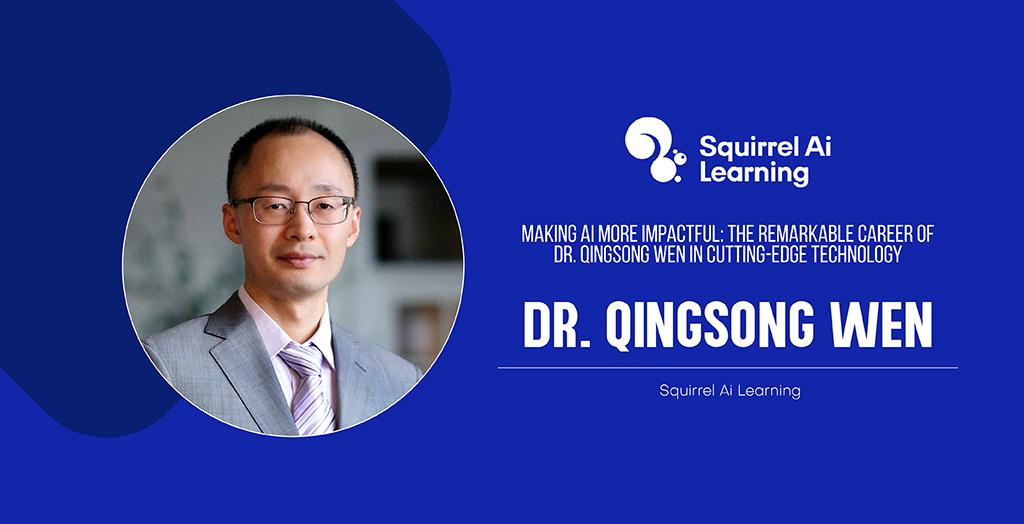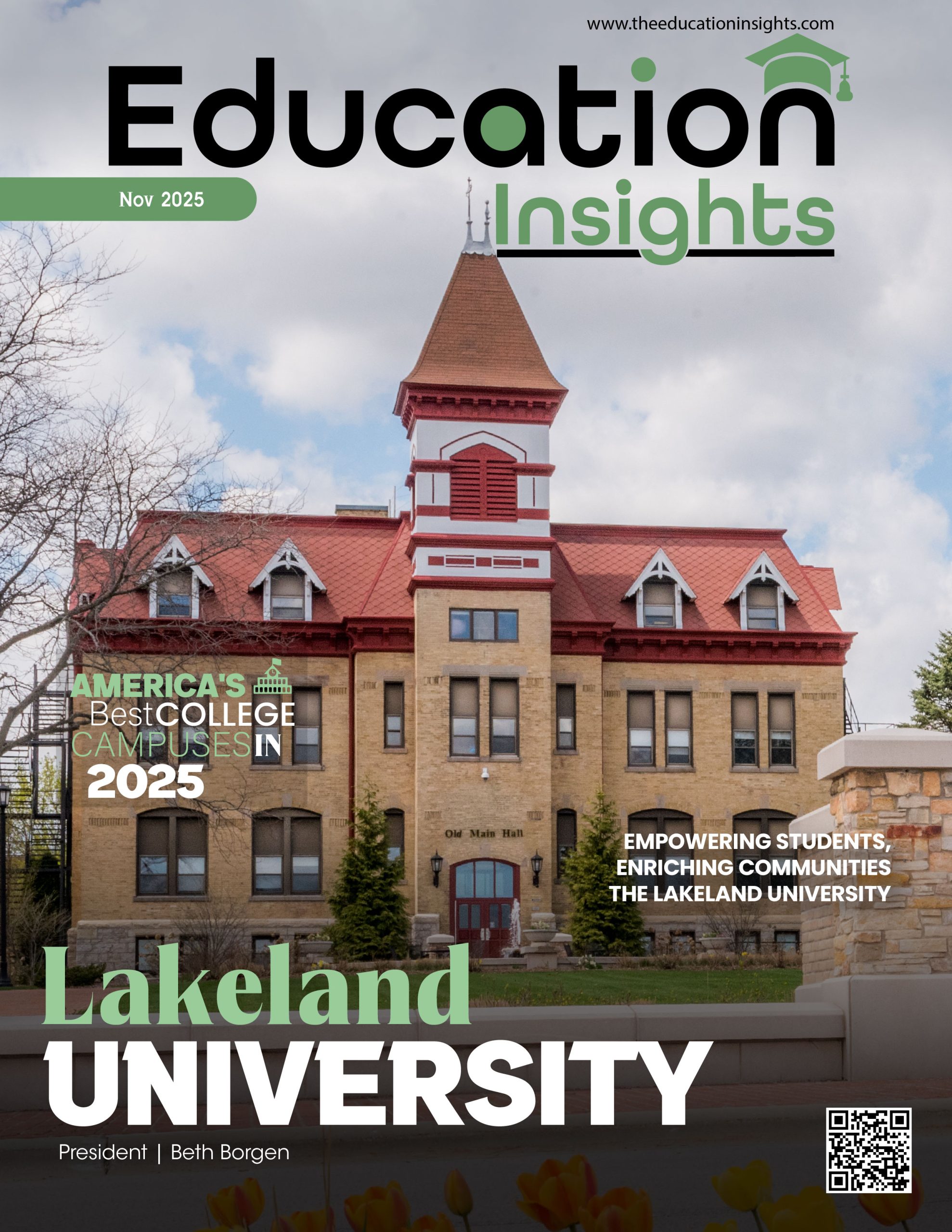Introducing Dr. Qingsong Wen, an accomplished leader and technology innovator. As the Head of AI & Chief Scientist at Squirrel Ai Learning, he is dedicated to advancing AI technologies for education. In academics, he holds MS and Ph.D. degrees in Electrical and Computer Engineering from the Georgia Institute of Technology.
Dr. Wen has published over 120 research papers in top-ranked AI conferences and journals and has received multiple IAAI Innovative Application Awards at AAAI. He also won First Place in the SP Grand Challenge at IEEE ICASSP. Additionally, Dr. Wen serves as an Associate Editor for renowned AI journals and frequently acts as an Area Chair for leading AI conferences in the field.
The Inspirational behind the Beginning: A Spark Ignited
Dr. Wen’s journey into AI and machine learning, particularly with Squirrel Ai Learning, began with his passion for harnessing technology to solve real-world problems. During his initial PhD studies at the Georgia Institute of Technology, he recognized the immense potential of AI to create a positive impact across industries. The vision of Squirrel Ai Learning, which focuses on personalized learning paths, resonated with Qingsong, as it aligned with his aspiration to make AI more impactful. He believes every learner’s need deserves a unique education, and AI’s ability to adapt in real time to each learner’s needs represents a breakthrough opportunity.
Years of Expertise: Shaping Dr. Qingsong Wen’s Approach to AI
Dr. Wen has extensive experience in practical research and development across various areas, including time series analysis, anomaly detection, recommendation systems, and optimization. While working at Alibaba, he focused on large-scale data processing and AIOps solutions that handled complex real-time analytics. These experiences sharpened his ability to build scalable, high-accuracy algorithms while balancing performance with cost and speed. Now, at Squirrel Ai Learning, Dr. Wen applies similar technologies to the field of education. Student learning histories can be likened to time series data, allowing for the use of predictive modeling to create personalized learning paths. When students encounter difficulties while studying, anomaly detection and root-cause analysis can identify the specific issues. Additionally, recommendation and optimization algorithms guide students to the next most appropriate piece of learning content.
Fostering Innovation and Creativity in Teams
The algorithm team at Squirrel Ai Learning has a united group of diverse researchers and applied scientists from leading institutions and companies in both the U.S. and China. The leading team encourages regular sharing of progress, challenges, and breakthroughs among team members. Additionally, the team hosts internal tech talks and invites industry and academic experts to conduct seminars.
Openness is essential to their culture. They embrace open-source initiatives, collaborate with external researchers, and promote an environment where publishing at and attending related premier AI conferences (like NeurIPS, AAAI, KDD, AIED, etc.) are strongly supported. This mindset helps ensure that researchers stay at the forefront of AI technologies, sparking creativity that leads to more innovative solutions for students.
Dr. Qingsong Wen’s Leadership Strategies: Aligning Research with Real-world Challenges
At Squirrel Ai Learning, the visionary leader effectively balances short-term, application-driven research with long-term, foundational investigations. In the short term, the AI teams focus on immediate challenges—such as optimizing the adaptive learning modules, improving recommendation accuracy, and supporting AI-student interactions. At the same time, the team dedicates R&D resources to exploring next-generation technologies, including multimodal large models and advanced behavioral analytics, which have the potential to transform the future of education. They also maintain frequent feedback loops with educators and students. By understanding the challenges from the ground up, the AI solutions developed are designed to meet real-world needs.
Building and Managing Cross-disciplinary Teams
Squirrel Ai Learning fosters a culture of open-mindedness and encourages active ideas among different teams—including AI researchers, applied scientists, product managers, and experienced educators. Moreover, the team promotes a deep understanding of each team’s roles. For instance, AI researchers should appreciate the pedagogical insights of educators, while educators can benefit from understanding the capabilities of AI. By bridging these perspectives, they create a richer environment for collaboration and a more holistic approach to innovation in educational technology.
Spearheading AI Projects in EdTech: Key Lessons
In practice, efficient solutions often outperform those that are overly complex. Sometimes, the most advanced algorithm may achieve marginal performance improvement but can be too expensive or slow for practical use, especially when scaled. Dr. Wen and his team have learned to prioritize the best balance between accuracy, speed, and cost to effectively serve millions of students. Continuous learning and adaptation are also crucial. Since AI evolves rapidly, it is essential to stay up-to-date with state-of-the-art techniques while simultaneously pursuing foundational research, which is key to long-term success.
Integrating AI-driven Insights to Personalize Learning
Dr. Wen has recently led a team that developed a comprehensive adaptive learning system at Squirrel Ai Learning. This system is powered by the Large Adaptive Model (LAM), which was trained on vast amounts of educational materials and over 10 billion personalized learning behaviors from the 24 million students. Squirrel Ai Learning offers nanoscale knowledge point analytics, effectively diagnosing individual student needs, recommending learning materials in real time, and others. The system demonstrates an impressive accuracy of over 90% in various adaptive learning and personalized learning scenarios.
The Misconceptions about AI in Education
One misconception is that “AI is always 100% accurate and free from bias.” In reality, AI systems can inherit flaws from their underlying data or algorithms. Therefore, robust development and ongoing monitoring are essential to minimize errors and inequalities. Another misconception is that “AI alone can solve every educational challenge.”. While AI is a powerful tool, it is most effective when combined with domain expertise, skilled educators, and proven teaching methods.
Ensuring Equitable Access to AI-driven Learning Solutions
To promote equitable access to AI-driven learning solutions across different socioeconomic backgrounds, companies should develop content in multiple languages and dialects to eliminate language barriers for learners. They should collaborate with nonprofits, local governments, and educational institutions to tailor solutions that address the unique needs of each community, making them more accessible and culturally relevant. For instance, Squirrel Ai Learning has donated millions of free AI learning accounts to underprivileged families in China, demonstrating how EdTech companies can alleviate financial barriers and expand learning opportunities.
The Future of AI: Replacing Traditional Education or a Hybrid Approach
Dr. Wen believes that a hybrid approach to education is more realistic and ideal. While AI excels at providing individualized lessons, instant feedback, and automated grading, it cannot fully replace the emotional support and mentorship that teachers provide. By combining the best of both worlds—AI-driven personalized learning and human empathy—one can revolutionize education without losing the irreplaceable role of teachers.
Words of Wisdom for AI Researchers: To Make an Impact The Significance of AI Agents: Personalizing Tutoring and Student Engagement
AI agents are becoming increasingly sophisticated in their ability to tailor content to individual learning paths. The next generation of AI agents, equipped with multimodal models, will more accurately and efficiently interpret voice, text, and visual cues to provide real-time support. “We’re moving toward a world where each learner has a digital “co-pilot” that identifies issues at a very detailed level and suggests targeted practice or enrichment activities—ultimately enabling unique learning experience to each student,” asserts Dr. Wen.
Words of Wisdom for AI Researchers: To Make an Impact
Dr. Wen encourages aspiring AI researchers to observe and engage with students to identify real pain points. It is essential to stay updated with the latest innovations by attending leading AI conferences such as NeurIPS, ICML, ICLR, and KDD, as well as education-focused events like AIED and LAK. This will help researchers keep pace with technological advancements and pedagogical insights. By combining robust AI techniques with a deep understanding of real-world challenges, researchers can drive improvements in educational scenarios.










